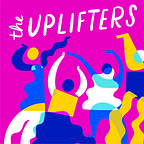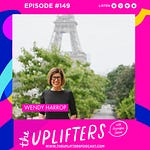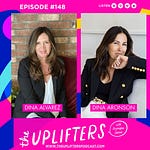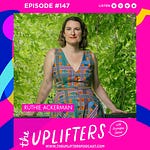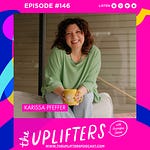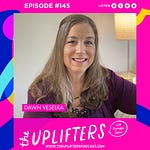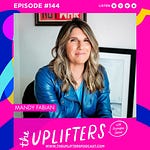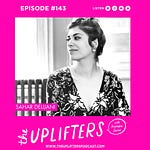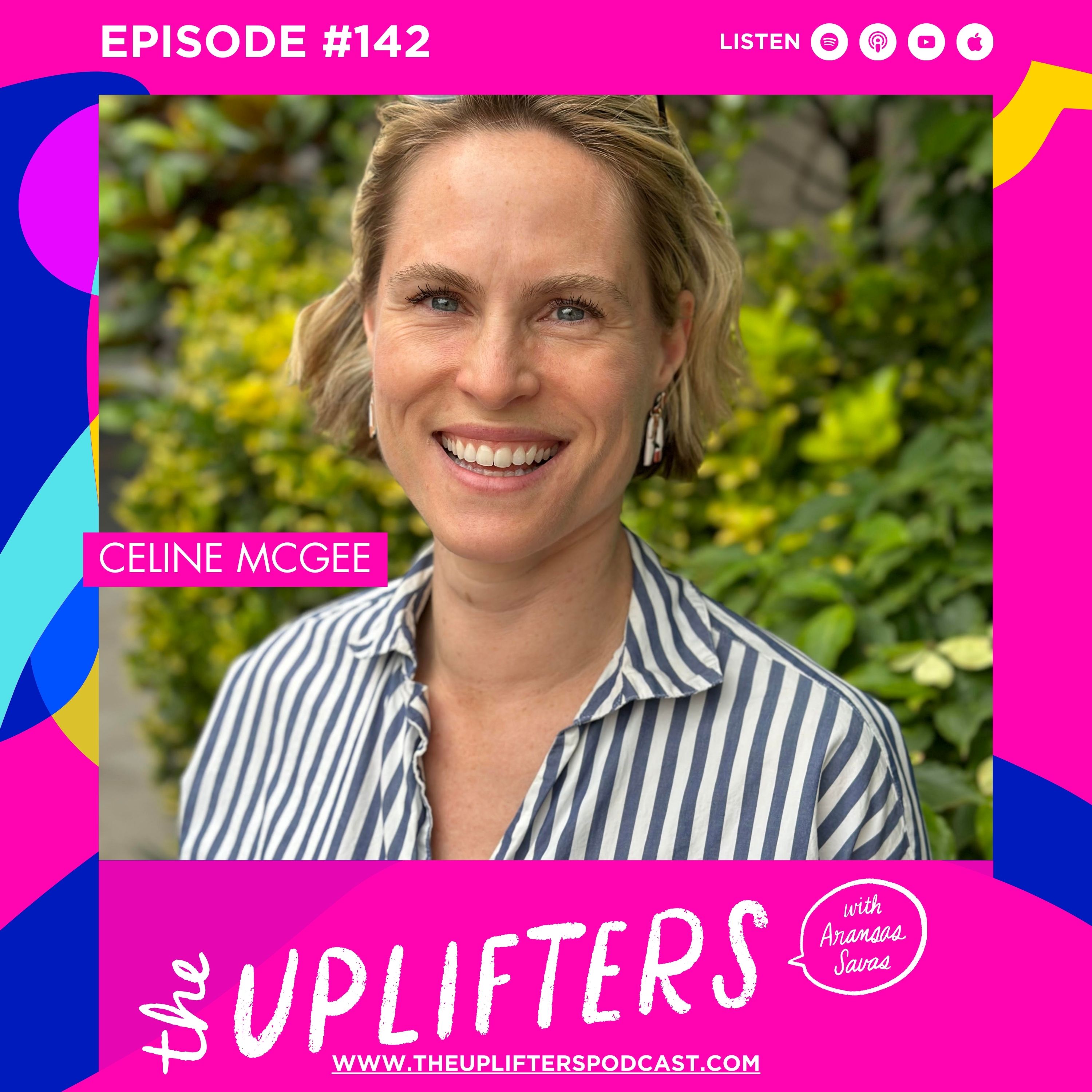Listen to our latest episode in the player here, on Apple Podcasts, Spotify, or wherever you get your podcasts. Watch us on YouTube.
Hey there, Uplifters!
Julie B. Hughes , author of Staring Down A Dream: A Mom, A Marathon, A Mission, fell in love with running when she was just a young girl. It was the perfect antidote to the relentless urgency of farm chores. She started racing and winning early and kept going. She landed a spot on a competitive college track team, and while the Olympics didn’t feel like a realistic goal, she set her sights on following in the footsteps of the heroic women who blazed the Boston Marathon trail. Like the good girl she is, she trained her heart out. And in the end, maybe that’s what stopped her. Her body began to suffer from mysterious pains that ultimately forced her to set her Boston Marathon dream aside. Eventually, she found the right support to understand the mind-body connection that was standing in her way. In this episode, you’ll hear about Julie’s 20-year journey to the start and finish lines of the Boston Marathon.
This episode might be for you if…
You’re a people pleaser
You grew up believing that progress comes from pushing the pedal to the metal and continuing to grit your teeth and keep going no matter the pain
You’ve wondered if your mindset and thoughts might be playing a role in your body’s pain
You feel like your thoughts might actually be the biggest barrier between you and success
Your inner judge is exhausting you
You're feeling stuck and struggling to make progress toward your dreams
Lift Up: Putting it into Practice
In this conversation, you’ll meet Julie’s inner critic: Aunt Pheobe. We all have an Aunt Pheobe in our heads. She’s the one who distracts us from our goals by telling us, in one way or another, that we aren’t good enough. She’s usually well-intentioned and wants to protect us from risk, fear, and loss. But, she can also stop our growth. If Aunt Pheobe is in the driver’s seat in your life, one powerful way to begin transitioning her into the passenger seat is to create a Judgement Journal.
Spend a couple of minutes each day reflecting on the times you thought or felt like you weren’t enough, or that you weren’t accepted, loved, or safe, or as though you were being criticized. Then, notice the patterns among these thoughts and feelings. Becoming aware of these thought patterns allows us to better understand them, challenge their validity, and move past them.
Keep Rising Higher with Julie
Julie B. Hughes is a writer, marathoner, self-published author, and licensed physical therapist. She lives in Manlius, NY with her husband Jeff, and two children Brindsley & Delaney. She is thrilled to share her most recent book Staring Down a Dream: A Mom, a Marathoner, a Mission.
Follow Julie’s journey and read her beautiful poetry by subscribing to her Substack Run to Write .
Messy Transcript
Aransas Savas (00:03.124)
Welcome to the Uplifters podcast. I'm your host, Arances Savvas, and I've worked in coaching, research, and behavior change for the last 20 years, talking to the women who uplift and inspire us, but can also get stuck on their journeys along the way.
Aransas Savas (00:22.636)
In each episode, we talk to an inspiring woman about her journey and mindset to understand how she overcomes the inevitable obstacles we face so that she can keep moving forward. And today, I am just beyond excited to meet, for the first time, today's guest. Now, I first heard about her when I read about her book, Staring Down a Dream, a Mom, a Marathoner, a Mission,
About her journey to reach the starting and finish line of the Boston Marathon. I read about it my first thought honestly was, oh, did I write a book and forget? Because like Julie, I'm a mom.
Like Julie, I am a mom of two kids, and I'm based in New York, and I've run marathons for 20 years, and I've had this one big goal of crossing the Boston Marathon finish line. And of course, anybody who knows me would say I'm on a mission. So when I read through Julie's book, I was honestly a little bit stunned to read how much more we had in common. Notably that of all the marathons in all the world, we qualified on the same day within minutes of one another at the same race. So to say that I feel a sense of kinship with her, even though I don't know her, is a bit of an understatement. But I'll tell you the thing that stunned me the most. Not that our lives have looked so similar in so many ways, but that the way we overcame this big hurdle in our lives that we achieved this massive stretch goal for ourselves was through the same mindset technique. And so today, in this episode, we're going to talk about what made the difference for
Maybe this story will help you find some fuel to power your progress. Julie, welcome. Thank you for being here.
Julie Hughes (03:05.838)
Oh my gosh, thank you for having me. Oh my gosh, I love that intro. I got goosebumps.
Aransas Savas (03:12.012)
It's crazy. Honestly, when I told my husband about you and my children, they were all like, “Mom, did you write a book?”. And now I don't feel like I have to. Thank you for writing our book. I think we'll cover in this that.
While on the surface there's so much about our lives and our relationship to running that is similar, there's also a ton that's very different. But before we get into all of that, I think we have to talk about Boston. And for us, it's been this big goal off in the distance for years. But.
When I say Boston Marathon, I think for a lot of people, it's not gonna have as much meaning. So maybe we ground ourselves in why that dream mattered first. What was it to you that made Boston so alluring that you chased it for 20 years?
Julie Hughes (04:19.502)
There's a lot there. I think the first thing is the women that came before us. I mean, I don't know how many people know the story of Katherine Switzer, but for her to go to that race and to say, I'm gonna finish that race, even if someone's grabbing me, trying to rip my bib off me from running, that just that courage and that bravery alone.
Julie Hughes (04:48.998)
As a young girl, I was like, I want to be like that. When you are a runner, when you are seeing these women ahead of you, oh, I want to go there. I want to do that. I think too, you know, I don't know about you, but when I was a young girl, oh, I want to go to the Olympics. I remember making a picture and then on the back of that picture, I'm going to run in the Olympics. I mean, I've heard that so many times, but I was one of those girls. And I felt like the Boston...was like would be the second option. Okay, I can't get to the Olympics. Well, I can get to the Boston Marathon. That is attainable. That is something I can do.
Aransas Savas (05:28.780)
So for those of you who aren't familiar with the Boston Marathon, it is the only race, really, in the world for which there are strict qualifying standards for the marathon. When did your love of Boston and your curiosity about this race begin?
Julie Hughes (07:17.998)
So, you know, I started running, I don't know, five, six years old, going to races. My uncle would take me, and that's really where the love and the joy of it began. It wasn't until I was in high school and started running for the team that, you know, I would hear coaches talk about Boston. I would just hear, you just hear people talk about it at races and in the running community.
Julie Hughes (07:44.478)
you know, you would grab books and read about it. So I think just hearing it and there was this.
Julie Hughes (07:53.362)
And again, for me, I felt like, okay, if I get there, then I will be loved, I will be worthy. So there was this mixed feeling of, okay, I have to run Boston, then yes, and I'm a good runner and I'm, and I, yeah, I'm lovable and people will notice me and see me and I matter. So there was, you know, in that beginning part there in my young adult life, where I felt like it was kind of my identity if I can get there.
then my life is gonna change, things are gonna be better. And as my life progressed, I realized that none of that is true. But there was still this desire to run it, no matter what. I was like, I wanna be there, I wanna run it. And I think just having, accepting that no matter what happens through this journey, when I get there.
Julie Hughes (08:52.902)
Oh, the joy, just the pride in crossing that line.
Aransas Savas (08:57.196)
And so you ran your first marathon when you were quite young, a teenager.
Julie Hughes (09:05.386)
I was a high school senior actually and I ran that for a teammate of mine who passed away from leukemia. So I ran through team and training. And I think that also just spurred this too that, you know, I want to run this for maybe people that would have wanted to that aren't able to. And I can. I can do that.
Aransas Savas (09:30.924)
And it really powered, it sounds like, your sense of purpose in racing. So from reading the book, I know that you ran that first marathon. You finished. You were like, wow, that was hard and amazing, and I can do this. And there is this big possible dream. If I'm not going to go to the Olympics as a marathoner, the next best thing is to chase Boston.
Aransas Savas (09:59.820)
And so you actually qualified not long after that.
Julie Hughes (10:05.994)
Right, so I qualified, it was my senior year of college, so I was just getting out of college for my four years, and I qualified, and then, and then that's when my life just sort of went downhill, to be honest.
Julie Hughes (10:24.874)
Unfortunately, but it was, I mean, this is where I learned and grew and did the work. But yeah, I was ready to go. I was ready to go to Boston in 2003. 2003. And I didn't physically get there till 2021.
Aransas Savas (10:43.852)
What a journey. Who knew?
Julie Hughes (10:46.286)
Yeah, no, I know, who knew? And it's easy now to look back and be like, oh my gosh, you actually, I mean, that's a long time to want to get to one marathon. But it did it, it meant more to me than just crossing. It meant a lot of things. Like I said, for other runners I knew that aren't here anymore, to prove to myself too, that I can keep showing up and I can do this.
Julie Hughes (11:16.542)
And even through all the setbacks and the challenges, you know, don't give up on those dreams.
Aransas Savas (11:24.652)
And to prove to your kids, I think you've said, yeah.
Julie Hughes (11:26.614)
Yes, yes, to show them that yeah, we have this plan. We want all these things to go our way, but they're not always gonna go our way, right? We know this, we know this as adults, but right, we're still like, wait, we're gonna have a tantrum because that should have happened, right?
Aransas Savas (11:43.180)
And that's exactly what happened in 2003.
Julie Hughes (11:45.302)
Yes. Oh, yeah.
Aransas Savas (11:47.564)
So what got in the way? Yeah.
Julie Hughes (11:51.074)
Pain, pain got in the way and it wasn't, and it was physical pain, but it was the years of emotional pain that I was just shoving down and not acknowledging. And not understanding the link, not understanding the mind-body connection. Yes, they are, there's no separation. And I think that's the biggest thing. I just want people to understand there is no separation. You know, what we think matters, it affects how our...
Julie Hughes (12:18.006)
our body feels and what our body's going through it. I mean, it's constantly communicating, constantly. The body's communicating to the mind, the mind's communicating to the body. But at that point, I didn't understand that.
Aransas Savas (12:31.660)
So talk to me about that journey to, I mean, so you were injured, your knee was debilitating, and so there was this physical pain that actively stopped you and made you say, wait, what? So what was the journey to understanding that pain for what it really was?
Julie Hughes (13:00.078)
Yeah, it was a process for sure, because in my mind's eye at that point in my life, I'm like, okay, it must be my sneakers, or it must be I'm not strong enough. Okay, give me all the exercises to do. Just tell me what to do, and this is all gonna go away. And so I think in my mindset, okay, I just need to do this exercise. I need to get these right shoes. Again, pushing away that what I'm telling myself
Julie Hughes (13:30.318)
That doesn't contribute at all. So it took a long time because I had this belief that it was something was wrong with me. I needed to be fixed. Oh, you're a little, oh, your ribs are not right or you're a little crooked or you're, you know, and not to dismiss any of those things, but some of those things are just not.
Julie Hughes (13:56.846)
you're not going to fix them and to assume that we can is just setting, it was setting me up for failure because I can't change some of these structural things about my body. Um, so it was going through a lot of seeing a lot of people, seeing a lot of different clinicians going to physical therapy school because I'm like, all right, I want to figure this out. I want to know what I need to do. What do I need to learn, um, to help myself?
Julie Hughes (14:24.910)
And again, it always just kept coming back to the muscle, the ligament, the herniated disc. Oh, your sacral iliac joint isn't where it's supposed to be.
Julie Hughes (14:40.814)
You know, so there's all these little things that I'm thinking, oh, so I mean, so I don't even want to go into all the gadgets and the things I bought. And at this point now, I'm a physical therapist. And to say that I was major imposter syndrome because I'm thinking, OK, I'm having this pain and I can't even figure it out. How am I supposed to help my clients? So I'm up at night studying constantly, going to all the classes.
Julie Hughes (15:10.958)
I want to know everything so I can help these people and then in turn help myself. And it was never enough.
Aransas Savas (15:18.636)
I think too, whether it's racing or any other dream, there's so many ways in which we get trapped. And all right, let me just get all the little quick fixes, all the little external diagnoses, and you talk about like the muscles, the ligaments, the joints, the vitamins, the I'm not eating enough kale, right? Like there's all these things that it's like, maybe if I do this one little thing, it will change everything. And so we change, we change, and we burn out, I think, all of our mental and physical energy on hope.
Aransas Savas (15:57.164)
It's like maybe if I read this book, or I see this expert, or it's just exhausting. And the thing that I think is so profound is when you said, well maybe I'll just study harder. And then we get these messages, I think that it's like, well, if you just worked harder, if you just saw more experts, if you just did more things,
Aransas Savas (16:20.140)
then you'll be fixed, you'll be okay. And I see this with so many runners I've worked with, but I also see it with people in their marriages and their friendships and their jobs and every part of our lives, it's like, read this one thing, do this one little thing, and this quick fix, this will be the thing that will make it all okay. But ultimately, you did all those things and you were still in pain.
Julie Hughes (16:46.062)
Oh yeah, I had rock solid abs and I'm still hurting. Why was that? You know this constant, oh you've got to have a stronger core. Oh come on.
Aransas Savas (16:59.436)
Now you've got a stronger core and you're in pain. Wee. Yeah.
Julie Hughes (17:03.566)
And I hurt, right. And I'm, yeah. And I, oh, and I have to be thinner. Oh, I need to be thinner. I need to lose some weight.
Aransas Savas (17:11.340)
Mm-hmm. And it was all just a distraction.
Julie Hughes (17:13.582)
So that was a whole nother dynamic I had to move through. That whole thing. Oh, we gotta be thinner to be faster. We gotta be thinner to be better. If we're thinner, then we're happier. That's a whole nother conversation. And it's bright, yes.
Aransas Savas (17:29.452)
And it's a whole other conversation, and it's all the same.
Aransas Savas (17:35.148)
You've got to be more. You've got to be different. You've got to be less. You've got to be older, younger, slimmer, heavier, stronger, weaker, whatever. And it just, it becomes impossible to actually achieve what you want, which is to feel good.
Aransas Savas (17:56.748)
So what finally made the difference for you, Julie?
Julie Hughes (18:02.286)
Well, I think for me, you know, I was, I did therapy. So I was working with a therapist who at one point was like, Julie, I, and I give her so much credit. She's like, I can't, I can't help you at this point. We need to link you up with someone else. And it was at this point where I linked up with someone and we did what's called EMDR. So it's basically a desensitization therapy to heal my brain. Um, because there was some traumatic things that happened as, as when I was young.
and this was feeding into it. At that point, I just was becoming a mother, and so I was starting to have these nightmares. Things were coming up because I never healed from this trauma as a child. And I'm thinking, this is crazy that this stuff's coming up. So anyways, I'm doing EMDR, and...That's when things really started to change. I think it was just because I think my brain was finally starting to be able to pay attention to what are my thoughts? What am I saying to myself? What do I believe? Just to even ask that, to sit back and ask yourself, okay, who am I? What do I like? What do I wanna do? I think so many beginning...parts of my life were just doing to what, I mean, there's so many dynamics and things that contributed to my story, but this people pleasing, that was built in. So to go through that treatment, that is what really helped me start to get things moving. And then working with someone to start recognizing, okay, this is your circumstance, what is your thought about this? Because that's going to create the feeling and the feeling is going to create your action and the action is going to create your result. And so just understanding that was like totally, I was like, what? Wait a second. Are you kidding me? The fact that I can control what I think and that no one else has control over how I feel. That was huge for me. That was huge.
Aransas Savas (20:18.604)
Yeah, and to realize your power.
Julie Hughes (20:22.062)
Yes. And to not be the victim anymore. To take responsibility. You know, and not that I wasn't, you know, I really was working hard to figure it out. I just was going about it the wrong way. I wasn't looking at, there's a lot of contributors to pain, but for me a big part of it was that self-talk, was that judge those saboteurs, right, that are just.
Aransas Savas (20:53.932)
Aunt Phoebe is maybe the main character in your book.
Julie Hughes (20:55.662)
Aunt Phoebe. Yeah. One of the main characters, yes.
Aransas Savas (20:59.820)
She's the antagonist. Yeah, so talk to us about Aunt Phoebe. What does she represent?
Julie Hughes (21:01.998)
My inner judge. Yes. I, oh yeah.
Julie Hughes (21:10.990)
So I worked with someone who said, you know, name your inner judge, describe her. What does she look like? What does she sound like? Become friends with her. And that really helped. Some of my poems are about her. Some of my writings are about her to understand, okay, this is a part of me, but what she's saying isn't true. She just wants to protect me. She wants to keep me safe. And I had to understand that pain.
is also protecting me. Pain is a way to keep me safe, but it's not always, my mind doesn't always get it right. My brain doesn't always get it right.
Julie Hughes (21:50.158)
So to understand that those thoughts can contribute to my physical pain was huge. So to understand, okay, what is Aunt Phoebe saying here? Is this true? Is this outdated? Do I still want to believe this? Do I still wanna keep saying this to myself?
Aransas Savas (21:56.300)
Mm-hmm.
Julie Hughes (22:15.310)
And a lot of the thoughts I'm like, and where did this, this isn't even what I believe. This isn't even serving me anymore. So to be able to really sit with that and do that work.
Julie Hughes (22:29.198)
was really healing.
Aransas Savas (22:31.148)
Yeah, and it goes back to those big questions you asked a minute ago. Who am I really? What do I really care about? And not what have I absorbed through the messages I've gotten from coaches and parents and friends and media, but what's really true for me?
Aransas Savas (22:48.876)
And how do I let those thoughts guide my beliefs and actions as opposed to the thoughts and feelings I've absorbed through my circumstances? Yeah.
Julie Hughes (23:01.262)
And you know, if I want to feel more curious, if I, you know, because I do, I want to feel curious about this, about this pain or about what's going on. Well, what thought would I have to feel that?
Julie Hughes (23:14.638)
So be able to recognize too. What thoughts do I wanna say? I mean, that's something we need to be delivered about because Aunt Phoebe, man, she is coming for me and she just wants, she is waiting on the side, just da-da-da-da-da-da-da. And I have to be like, okay, yeah, I hear you. No, not today. This is what I'm gonna say today.
Aransas Savas (23:36.044)
Well, and I think for me and so many of my clients, it's a distinction between Aunt Phoebe and truth, right? And so we think Aunt Phoebe is the law of the land. This is the only perspective. You are in pain because there is something wrong with you. You are too much, too little, too fast, too slow. And that, when Aunt Phoebe says it, it sounds like an authority. Like.
Aransas Savas (24:04.812)
There is no other story that might exist. And so when you talk about curiosity, I think what you're saying is like, what else might be true?
Julie Hughes (24:14.478)
Exactly. And I think too, you know, I don't know for other listeners, but for me too, I feel like I had to be hard on myself or I wasn't going to get there. So you almost have to watch out for that, is okay, we don't, that's not, I don't think that's helpful either to be hard on yourself. That's not power. That's not a sage power.
Right? Just be attacking yourself and, oh, you've got to do this and you've got to work harder. And so I'm still working on that because it's been ingrained in me for so long. And so I think that's the other thing. I think we, I had to finally accept that, okay, she's here, yeah, make friends with her, but start recognizing, just start questioning that those thoughts. Whose voice is that?
Aransas Savas (25:09.612)
Mm-hmm. And is that voice helping? Do I feel more empowered, inspired, able when I hear that voice? And sometimes, I'm going to work harder can feel really inspiring. And sometimes, you're not working hard enough is disempowering. It's not clear cut or simple.
Julie Hughes (25:13.710)
Mm-hmm. Yeah. Because how do I feel? Right.
Aransas Savas (25:37.708)
It's very subtle and the effect, I think, is what we measure. I ask clients to do this a lot, to say, well, how do you feel when you hear it that way? And so noticing and understanding the impact of it on our systems and on our motivation and our energy, that's the measure.
Julie Hughes (25:56.526)
That's it. That's it. How does it feel in your body? Where do you feel that in your body? Because again, if your nervous system is looking out for you, and what are we saying to ourselves? Well, if that's a threat, our nervous system is going to dial right up and that's me. My pain went right up because of, again, the language I was saying to myself.
Aransas Savas (26:20.428)
You're really good at protecting yourself.
Julie Hughes (26:25.006)
Which I get, it makes sense, right? But, too, but yeah. But overprotection. Yes, right, right, right.
Aransas Savas (26:25.164)
And yeah, yeah, yeah, what a skill. And it's going to help you. And it has helped you. It saved you in those times of trauma, no doubt. But now, now it was over protecting you. Now it was shielding you from success or progress because you were so, quote unquote, safe. Yeah.
Julie Hughes (26:50.990)
Yeah. Oh yeah, I wanted to hide.
Aransas Savas (26:54.348)
Yeah, yeah, and it worked. Your body and your mind worked together to do that. So when you recognized Aunt Phoebe and you realized, oh hey, that's just Aunt Phoebe. Bless her heart. She's here to help me, but there are other options. What started to change for you, Julie?
Julie Hughes (26:58.382)
Yes, that's right.
Julie Hughes (27:23.438)
I went running. I'm like, okay, I'm gonna run. You know, and I think that was a thing that really.
Aransas Savas (27:29.292)
And it brings tears to my eyes to hear you say that because again, I think we have to contextualize this. I think for the people who haven't read the book, you had been running since you were five. And it was everything for this little farm girl. That is where our stories are different. I was not running when I was five. I was the chubby kid avoiding it at all costs. But from age five, it was like a survival mechanism for you.
Julie Hughes (27:43.310)
That's right. That's right. Yeah.
Aransas Savas (27:59.628)
And then to have that ripped away from you, it felt like you almost had to have that one outlet removed in order for you to do this other work.
Julie Hughes (28:14.254)
Absolutely. Because that was my only tool I had, was to run, run, run. That was how I escaped, how I dealt with the stress, how we dealt with the voice. You're not good enough, I'm just going to go run. So yes, I absolutely see that now. I mean, of course, it was painful to not be able to have that. But I was like, OK, I've got to figure this out. So when I recognize that, OK, my thoughts are a big contributor.
Julie Hughes (28:41.934)
And it wasn't that my pain was gone, my pain was there. But I'm like, all right, I'm gonna run and let's see what happens. So when I start running and I'm feeling this tingling and this, I'd get these nerve symptoms in my feet and my legs. I'm like, all right, I feel it. But I could name it then, okay, this is my nervous system. Okay, these are my nerves talking to me, trying to protect me, looking out for me. If I keep running, what happens?
Julie Hughes (29:12.238)
If they get, if it increases, okay, then I will stop and walk. If it stays the same, I'm gonna keep running. I'm not changing my form. It's the same. And it was unbelievable because it would come on and I would just come, I would stay calm because before I'd freak out. I would stay calm and 99.9% of the time it would go away. The longer I kept going.
it would go away and by the end of the run it was gone. And so there was also an aha moment for me. I'm like, oh, this has nothing to do with my back or my SI joint or my knee or my IT band or my feet, or all these things over the years that I've accumulated. This is about my nervous system. And it's looking out for me. And it's looking out for me.
Julie Hughes (30:07.662)
you know, yes, when we have the flu, when we're run down, when we don't get enough sleep, but also what we believe about ourselves, what we're saying to ourselves, what we're hearing from other people, and then we're internalizing that and making it now, so, oh, I guess I have to think that now too.
Julie Hughes (30:29.166)
You know, because I have to, you know, even in this whole time, everyone's like, oh, you got to stop running. Don't run. Oh, man. I'm just so glad I didn't. I'm so glad I didn't. I would have never got to Boston.
Aransas Savas (30:39.404)
Yeah. Yeah. So talk to me about that. So you started running again, you started to understand your mind body connection. How'd you finally get to Boston?
I really just focused in on, okay, getting your sleep and eating well. I mean, nutrition, yeah, is important. So adding that piece in and figuring that piece out too was a whole nother area. But just to go for it again and believe in myself was big and to have other people behind me knowing, yeah, you can get there, you can do this.
Julie Hughes (32:24.238)
So when I finally qualified and then 2020, that was disappointing. That was disappointing. But I said, but you know what? It also made me laugh because I'm thinking, okay, I might as well wait another year. What's one more year? I've been waiting since 2003. What's one more year? And thankfully we were able to have that opportunity that they had it again in 2021.
Julie Hughes (32:53.422)
and I got to go and I got to bring my family. And I think, and it was perfect timing. It was perfect timing to have my children there, to have my husband there, my mom, see me cross the finish. I mean, I was, now, I mean, it's so easy now I could say, oh, I'm glad I didn't go in 2003. This was the, look at all how I've grown. And now look what I can show my kids. So that's the story I wanna, you know.
Aransas Savas (33:21.548)
Yeah, well, and I think, and I said before that I have chased the same dream for 20 years. I was a...
Julie Hughes (33:39.310)
That's alright.
Aransas Savas (33:48.844)
chubby kid who didn't run a block until her 30th birthday basically, somewhere in my 20s, when I was 22, I was like, I'm gonna quit smoking. And I woke up and I was like, I'm bored, I need something to do with my hands, so I should get outside. And somewhere I found like some converse, some not at all appropriate for running shoes.
Julie Hughes (33:58.990)
It's amazing, oh, great.
Julie Hughes (34:11.438)
No way.
Aransas Savas (34:15.180)
went for a run and it was that little burst of encouragement. Somebody was like, oh, good job. And I was like, well, I could run two blocks and two blocks turned into a half marathon, turned into a marathon for my 30th birthday. And I, so I like after those first few, I was just like still on the high of being able to do this thing. And then once that seed was planted that I could run faster, I got this big
Aransas Savas (34:44.524)
inspiring and terrifying goal.
Aransas Savas (34:52.044)
worked really hard, like you. I worked really, really hard. And I hear that, I think, in your book, but also in your telling of this story about how you tackled the mental hurdles. You put as much diligence and commitment and effort into taking care of Julie holistically as you did into running and chasing that goal. And so you are a person who efforts.
Julie Hughes (35:21.102)
Yes, I guess so.
Aransas Savas (35:22.028)
You are a person who is diligent and who shows up. Like I think anyone who reads your books will be struck by your diligence. It is core to who you are and how you approach every challenge. And for me the thing...
Aransas Savas (35:39.724)
that that was the thing I related to is I'm an efforter. I'm a hard worker. I am diligent. I showed up and I ran all the miles and I ran them with integrity and I committed myself. I'm not somebody who would have thought of myself as a natural runner or any sort of athletic ability. It was like this huge mental hurdle of, whoa, I am an athlete.
Julie Hughes (35:44.462)
Thank you. That's all right.
Julie Hughes (36:03.054)
That's right.
Aransas Savas (36:04.044)
Oh, and then I start putting in these times. And I'm good at distance, right? And so running sub-4 marathons for me was a pretty natural thing. But running a Boston qualifying time was not. It was such a big stretch goal that I had to really, really kind of overcome my own identity, to use your word, to even go there.
Aransas Savas (36:32.652)
And for me, after all those efforting, hardworking races, the thing that made the difference was showing up in 2018 at the Wineglass Marathon, which is so crazy that you were there BQing on the same BQing short for Boston Qualifying, for those who are not in the nerdverse with Julie and I on this, showing up and qualifying that day. Was it?
Julie Hughes (36:47.566)
So crazy. Yeah.
Aransas Savas (36:59.148)
My, I trained well, I was strong, I was ready, but I trained well and was strong and ready many times before and not done it. This time I was strong and ready and I had one major difference. I decided to run with as much love as possible. And it probably sounds kooky to everyone in the world but you.
Julie Hughes (37:07.118)
That's right.
Aransas Savas (37:22.092)
Because what I did is I just decided to look for joy everywhere I went and to run with as much softness as possible. And so what happened is I got out there and I ran with no effort.
Aransas Savas (37:37.292)
I just ran with full joy and I cracked jokes and I said hello to people and I didn't take it all so seriously and I looked for flowers and trees and signs and smiling faces and I was present. And I mean I'm gonna cry again. I was like the sappiest podcast ever. I just enjoyed it.
Julie Hughes (37:44.174)
That's it.
Julie Hughes (38:03.438)
I feel you, yeah.
Aransas Savas (38:05.356)
And what happened in my body was radically different. Because I got to the end of 26.2 miles, same distance I'd run many, many times, and I had no pain. I had no tension. I went hiking an hour and a half later.
Julie Hughes (38:10.702)
That's right.
Julie Hughes (38:22.542)
Wow.
Julie Hughes (38:28.558)
Ah!
Aransas Savas (38:30.860)
The difference was that my brain, this powerful force, had not released all of these fear and stress hormones into my body for over three hours. It had infused it with dopamine and joy chemicals and relaxation and pleasure. And so I finished the race. I...
looked at my time and I was like, oh, I ran every single mile at the same pace. I was within like three seconds without looking at my watch because it wasn't about efforting. It was about ease and enjoyment. So when I read your mindset, I saw something very similar.
Julie Hughes (39:04.334)
That's awesome.
Julie Hughes (39:17.134)
Yeah, it's...
Julie Hughes (39:22.542)
I think when I stepped on that line, it was the first time, and I've run many marathons, it was the first time I showed up and didn't put pressure on myself. I just came, I know I'm ready physically, I know I can do this. It's always the mental aspect. Every time I toe that start line, it's the mental aspect. What am I going to say when I do feel uncomfortable, when the pain comes?
Julie Hughes (39:53.902)
But I don't know what was different that time. I just, I already made up my mind that I made it. I already made up my mind when I came to that start line. I'm already, I already made it. And I think because I believed it already, it happened. I mean, I don't know. It just, it just was, it felt very different. And I just, I already knew on that day. And that was the same day that they lowered the time. Right? They lowered the time and I was like, ah, all right.
Aransas Savas (40:17.964)
the day before they lowered the time. But somehow I didn't process that. I was like.
Julie Hughes (40:23.470)
I'll run faster, no problem. I mean...
Aransas Savas (40:27.436)
So again, for those not in the nerd verse, they set these very strict qualifying times for the Boston Marathon by age, group, and gender. And right before our race, we had been training, Julie and I each for different age groups, I think, had each been training for a very specific time bracket. Right before our race, we found out that we actually had to run a different time bracket.
Julie Hughes (40:55.342)
I think they lowered it five minutes. So they lowered it five minutes. Yeah. Five minutes. That's a lot. That's a lot. That's huge. Yeah. That's huge. Because when you, and the thing is when you want it, we want to get to Boston, when you feel like you need this five minute buffer time so that you know you're going to get in. Cause right? You can still qualify and you may not get in. Right? And that happened to us. Yes.
Aransas Savas (40:57.804)
Yeah, it was huge. Five minutes is a bit, it sounds like not a lot of time if you're not a marathoner. Five minutes is a lot of time.
Aransas Savas (41:14.764)
Right.
Aransas Savas (41:18.124)
Which is another similarity in our stories, yes, that we both qualified the year before and didn't get in because our buffers weren't big enough, because so many other people had qualified. So it's so weird that that happened. And I think pointing out this time change and the fact like.
Julie Hughes (41:22.446)
2017, yeah, and we did not get him.
Julie Hughes (41:30.190)
amazing.
Julie Hughes (41:32.750)
I know.
Aransas Savas (41:38.892)
As runners, we spend so much time thinking it's got to be the perfect day and the perfect conditions and I've got to be wearing the perfect shoes and there's got to be the right temperature and humidity and...
Julie Hughes (41:51.886)
It's not going to happen. And I think that's the thing we have to like, we can't, okay, these are the circumstances. What am I going to think about it?
Aransas Savas (41:58.796)
Mm-hmm. That matters more. That matters more. Catherine Switzer did not have good shoes.
Julie Hughes (42:01.422)
That's it. That is it.
Julie Hughes (42:06.030)
No, and she was wearing sweatsuit. I mean, she was wearing a sweatsuit for goodness sakes. I mean, and she ran, and that's what I remember. And I love what she said. I'm gonna just crawl, I'm gonna crawl to that finish line. I mean, that's what she said. She's like, I'm gonna show women that we can run this distance and our uterus isn't gonna fall out. I mean, exactly. So the fact that she, she's like, well, I'm just gonna crawl to that finish line if I have to. And she did it, and she ran it, and she ran well.
Aransas Savas (42:25.996)
because that's what they were saying was the reason she couldn't run.
Julie Hughes (42:35.694)
Oh, I love her.
Aransas Savas (42:37.356)
There will never be a perfect circumstance or a perfect situation. But there are mindsets that work, and there are mindsets that don't. And even if efforting and working really hard and bearing down can get us there, it will not get us as far. Period.
Julie Hughes (42:40.622)
That's right.
Aransas Savas (43:04.332)
We will go further, we will go faster, we will feel better if we do it without all of that fear-driven efforting.
Julie Hughes (43:12.910)
Yes, right.
Aransas Savas (43:17.932)
Because I think for both of us behind all of those, I don't know, missed attempts, if that's the phrase to use for it, behind all those frustrations and all those disappointments, it was a fear of not succeeding.
Julie Hughes (43:25.774)
Yeah.
Julie Hughes (43:38.510)
Yeah, a fear of not getting there.
Julie Hughes (43:42.510)
Look, you're able to get there, what the heck? It's not like I'm not working hard, right? It's not like I'm not, yeah.
Aransas Savas (43:47.020)
I have a little post-it on my desk. It's like all tattered and sad looking. And it says, what if it works? And I leave that there to remind me of how often we are driven by another voice, which is Aunt Phoebe saying, what if it doesn't work? What if you fail? Everybody's going to laugh at you. You're going to look like a failure. You're not going to belong.
Julie Hughes (43:49.998)
Oh
Aransas Savas (44:16.620)
What has it meant for the rest of your life to train your brain, to train your thoughts, and your feelings, and your action with the same attention that you did your body?
Julie Hughes (44:28.686)
I'm just, I'm so glad I have this tool. Because it's helped my marriage, it's helped my parenting, I can teach my children. Hey, you have control over your feelings, nobody else. When we were little, oh, don't let them hurt your feelings. Well, no, they're not in charge of my feelings, I am. I'm in charge of how I wanna feel. So to be able to give them that too.
Julie Hughes (44:58.574)
But I will say whenever I do something I haven't done before, whenever I venture out there in this world, Aunt Phoebe's there. So I have to just keep, okay, I don't have to sit with her as long as I used to. You know, I would ruminate and you know, I am a lot better at that.
Aransas Savas (45:07.948)
Yeah, sure.
Aransas Savas (45:22.188)
It's training, right? Like.
Julie Hughes (45:23.086)
Yeah, it is. It is a practice just like running, just like writing. I mean, it's just... And anyone can learn it. That's the best part. It's a skill. But yes, daily practice. Daily practice. Yes. Oh, yes. Yes.
Aransas Savas (45:33.868)
moment by moment practice, right? In every situation. And it started with awareness for you of recognizing that Aunt Phoebe was even there. Yeah.
Julie Hughes (45:43.054)
That's right. And what is she even saying? Like, because you just don't even realize those thoughts because they've just been replaying and they're on repeat this pattern for so long. You really have to just sit with that first and understand what is even up there.
Julie Hughes (46:00.750)
But I will say becoming a mom that has been, my children have given me the opportunity to practice even more. Oh, because let me tell you, you're not doing this right. I'm not a good enough mom. All of that has been coming up.
Aransas Savas (46:19.564)
Yeah, that was the hardest part of being a new mother for me was the, everybody's looking at you and thinking you're not doing this right voice.
Julie Hughes (46:25.230)
Yeah, that's right. That's right. And nobody, I mean, there's no there's no handbook. We're all just trying to do the best we can. But then we're also but then we're causing more suffering on ourselves by what we're thinking. Yeah.
Aransas Savas (46:43.788)
Well, and I think that's it. And for everybody listening, if you're curious about what these voices might sound like for you, because they have different scripts for all of us. Uh-huh. And it's like, if the voices you're hearing are causing you stress, then they're worth examining.
Julie Hughes (46:56.014)
Yes, what are the messages?
Is it bringing you closer to what you really genuinely care about? Then it's probably working. And if it isn't, it probably isn't. Oh, Julie, this is so healing and therapeutic and beautiful to get to talk to you about this. I will say I have not run the Boston course yet. And I ran my 2020 with my family and friends around Brooklyn. And it was an amazing, beautiful day of celebration. And I have some unfinished business.
Julie Hughes (49:08.718)
Good.
Julie Hughes (49:13.998)
Oh god.
Julie Hughes (49:21.902)
Oh, you gotta, I'm hoping you get there.
Aransas Savas (49:37.420)
I just got physical pain soon after that and that's why. So this story too has me examining if maybe there's some work to be done to help heal my plantar fascia through the work that I'm doing on myself to maybe go there. But at the same time, I've also had some big conversations with myself about.
Julie Hughes (49:42.030)
Oh.
Aransas Savas (50:01.676)
whether or not it's still what I really want and care about. There are so many things I want to put my energy and attention into now that I'm not certain that running more actually makes me feel better and makes me feel healthier and happier. And when I do an inventory of what I give and take for running marathons, the equation doesn't necessarily balance out in favor of my holistic well-being right now. And so.
Julie Hughes (50:04.302)
Sure.
Aransas Savas (50:31.020)
That for me as a doer and achiever is a hard place to be. And I still don't know the answer, but maybe there will be a part two to this conversation. So in each episode, we do a quick lightning round. Tell me Julie, what is one quick way you raise your own energy?
Julie Hughes (50:34.158)
Yeah. Oh, I bet. I bet.
Julie Hughes (50:41.134)
That's right.
Julie Hughes (50:53.358)
Go outside and run or walk. But I gotta be outside. Gotta be outside.
Aransas Savas (50:56.044)
Ah.
Aransas Savas (50:59.468)
For those of you following along and pulling together a playbook of these boosts, there is something about nature and movement that keeps coming up. Just saying. Boost, how do you boost other women?
Julie Hughes (51:16.814)
listening. Listen. Just listen.
Aransas Savas (51:22.252)
I bet you're an amazing physical therapist. One little way you elevate your community, the planet, or the world, Julie.
Julie Hughes (51:33.710)
guess it would just be share what I can give. Share what I can give. So if it's through poems or listening whatever that is yeah.
Aransas Savas (51:47.244)
And who's the woman who inspires you? Who you think might inspire us?
Julie Hughes (51:52.686)
so many. Who do I put on the spot here? Oh my god, you know, I would say one woman who has really inspired me is Terri Tomoff. She is the author of The Focused Fight. Her son is a cancer survivor five times. And I met her through a writing group and I just, she is just amazing. Inspiring.
a go-getter, a mover and a shaker. I mean, she just, she really inspires me and I'm so blessed that our paths have crossed.
Aransas Savas (52:31.244)
Amazing. I can't wait to hear more about her. So where do people find out more about you, Julie?
Julie Hughes (52:36.302)
Yes, I'd love to share you.
Julie Hughes (52:42.446)
Well, I am on Facebook, Julie B Hughes. I also have a platform on Substack. So I share stories, poems, Monday through Friday, so they can find me there. It's Substack, Julie B Hughes, and it's Run to Write.
Aransas Savas (53:01.516)
And I will be sure to add links to that to our show notes and link to you through our sub stacks. So for all of you listening, please join Julie and I in conversation at Live Up Daily and at theuplifterspodcast.com where all of our guests are gathering and together.
Julie Hughes (53:06.766)
Yeah.
Julie Hughes (53:09.390)
Great.
Aransas Savas (53:24.108)
We are bringing our lived experience, our challenges, and skills for overcoming them into the conversation so that we don't all have to keep learning the same lessons on our own. We can learn from one another and through one another and hopefully tap into a little more belief.
A little more ease.
Julie Hughes (53:56.622)
Yes, ease and flow. Ease and flow.
Aransas Savas (53:58.924)
Yes, yes.
Aransas Savas (54:02.796)
to help us all move toward what really matters for us. So if this conversation has been helpful to you, please share it with the women who you love, the women who inspire you, so that we can all keep rising higher together.


